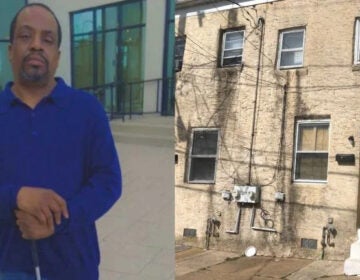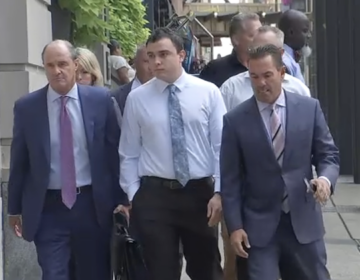New Delaware AG review finds no charges in 2015 police shooting of Jeremy McDole
Family and friends called for a new review into the death of Jeremy McDole, a Black man fatally shot in his wheelchair by Wilmington police five years ago.

Jeremy McDole (Courtesy of McDole family)
In July, dozens of protesters marched through Wilmington, demanding authorities reopen the investigation into the death of Jeremy McDole. McDole was sitting in his wheelchair in the middle of the street when he was killed by police in September 2015.
Police were called to the scene on Tulip St. in Wilmington after a caller to 911 reported McDole had shot himself. Police allege McDole was armed with a gun when officers arrived, but his family has long disputed that he had a weapon. A bystander’s cellphone captured video as officers repeatedly called on McDole to drop the weapon before the shooting. Police say they fired when McDole reached for his waistband.
An initial investigation by the state Department of Justice resulted in no charges against the officers involved. Prosecutors wanted to charge the officer who first opened fire just two seconds after shouting for McDole to “show me your hands,” but said the law immunizes officers from prosecution. That officer, Sr. Cpl. Joseph Dellose, performed “extraordinarily poor police work” according to a report from then-Attorney General Matt Denn’s office. When Dellose started shooting, other officers started firing as well, unsure of where the shots were emanating from, Denn’s report said.
In 2017, a federal judge approved the city’s $1.5 million settlement with McDole’s family.
The latest review of the case released by current Delaware AG Kathy Jennings came to similar conclusions as the previous DOJ report.
“The findings detailed in this report are thorough and unambiguous,” Jennings said in a statement. “Charging decisions under the laws at the time have not changed. Neither has our resolve for reform.”
WHYY reached out to McDole’s sister, but has not yet been able to speak with her.
Earlier this year, McDole’s family pointed to newly released photos of the crime scene and a gun next to McDole’s wheelchair that they say proved their accusation that the gun pictured was planted by police. They also claimed there were new witnesses who would tell a different story of the shooting.
Those claims led Jennings’ office to reexamine the evidence. After that review, DOJ’s Division of Civil Rights & Public Trust again rejected claims that McDole was unarmed and that police planted a weapon.
The DCRPT report also found:
- McDole’s DNA was found on the firearm collected at the scene.
- Gunshot residue – consistent with someone firing a gun – was found on McDole’s right palm and right sleeve, consistent with multiple witness reports that they heard either gunshots or fireworks before police arrived.
- DCRPT’s monthslong effort to follow up on claims that a new civilian witness had come forward, including subpoenas issued when the witness was unresponsive to DCRPT’s outreach.
“We cannot undo the tragedies of the past, but we can work to prevent them from reoccurring,” Jennings said. “I will continue to advocate for the establishment of a Statewide Civilian Review Board with subpoena power, mandatory statewide participation in a do-not-hire database, and the codification of an objective use-of-force standard.”
Changing the state’s “use-of-force standard” could make a difference in whether officers are charged in a shooting. A recent WHYY News analysis of the last 15 years of Delaware police shootings found not a single officer has been charged in the shooting of more than 56 people, 30 of whom were killed. That analysis also found that nearly half of the people shot were Black, even though Black residents make up just 22% of the state population.
After protests triggered by the killing of George Floyd by a Minneapolis police officer earlier this summer— Jennings announced that changing the law is high on her list of police reforms needed immediately.
“We have to do the tough stuff,” she said in June at a rally in Dover, convened by Delaware’s Legislative Black Caucus. “We have to change the things that haven’t been changed in this state for decades. Let’s bring it on and let’s get it done.”
WHYY is your source for fact-based, in-depth journalism and information. As a nonprofit organization, we rely on financial support from readers like you. Please give today.






